Table of Contents
I used to hate my job – I could feel my life slipping away sitting behind that desk.
So, I started looking for alternative ways to earn income. I stumbled across doing “SEO” for clients – my life was never the same.
I became obsessed. I read blogs, watched videos, built sites, worked for free – anything I could to learn SEO.
During that learning process, I tried every way imaginable to make money. This article will explore my learnings on how to make money with SEO.
1. Get job at an agency
I know, I know – this isn’t what you came here for, but hear me out!
After a few years of building and monetizing SEO websites on my own, I wanted to build an agency. However, I realized I didn’t have the technical SEO acumen to compete in the market.

The only way to learn refined technical skills is to work on big, complex, enterprise websites. I swallowed my pride and took a contractor job at SapientNitro where I was exposed to clients like Target, Best Buy and more.
Working in this environment helped me gain INCREDIBLY VALUABLE skills like analytics, technical SEO and how to build presentations for clients (to name a few).
If you want to be the best, sometimes you need to check your ego and go learn (ahem, also, WE’RE HIRING).
How much can you make?
According to Indeed, an SEO specialist can make anywhere from $40,000 to $100,000 annually. In my experience:
- 1 – 3 years of experience = $40k – $55k annually
- 3 – 6 years of experience = $55k – $95k annually
- 6 -1o years of experience = $100k – $140 annually
- If you’re a rockstar / executive, you can easily make $250k+ depending on the agency
Pros of working at an agency
- Ability to test and learn using other people’s resources
- A steady, solid paycheck
Cons of working at an agency
- Generally long hours in a chaotic environment
- If you’re an entrepreneur at hear, it sucks working for other people (I FEEL YOU ON THIS)
2. Sell products on your website (eCommerce)
According to a recent global survey by BrightEdge, organic search was responsible for 40 percent of revenue for e-commerce sites. If you know SEO, you can essentially build an eCommerce business off the back of it.
In 2015 I launched Laces Out, a niche eCommerce store that ran completely on organic traffic.
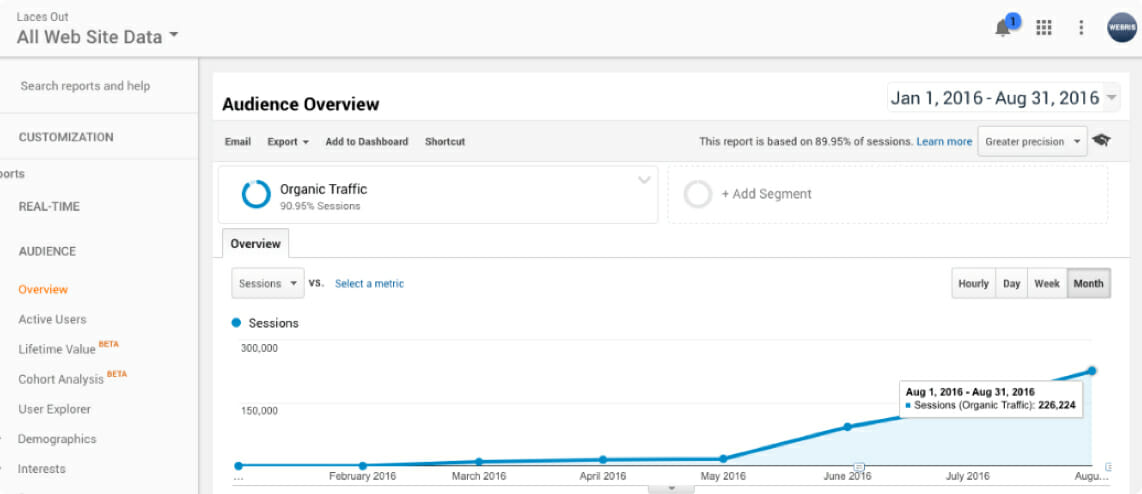
The store ran on WooCommerce and generated about $3,000/month in passive income. I sold it in early 2018 for about $70,000.
The key to success is finding the right product to sell – I use this simple chart when analyzing the viability of launching an eCommerce store. I call it the LOW / HIGH analysis:
| Low | High |
Find a product that is low cost
|
Find a product with high demand
|
Find a product that is low tech
|
Find a product with high passion
|
Find a product that is low competition
|
Find a product with high potential
|
Having an eCommerce business was great, but also a lot of work.
Pros of eCommerce
- eCommerce purchases are growing more and more each year
- It’s not just a way to make money, it’s a legitimate business model with a high ceiling
- Full control over your brand, it’s yours to build
Cons of eCommerce
- Dealing with vendors is time consuming and headache inducing
- It’s not a passive income stream – you will need to work (HARD) in order to make money
3. Dropship other people’s products on your website
If running an ecommerce site sounds like too much work, then dropshipping might be for you.
With dropshipping, you don’t hold any physical inventory. Instead, when an order is placed on your website, the retailer (or manufacturer) ships purchases directly to the customer.
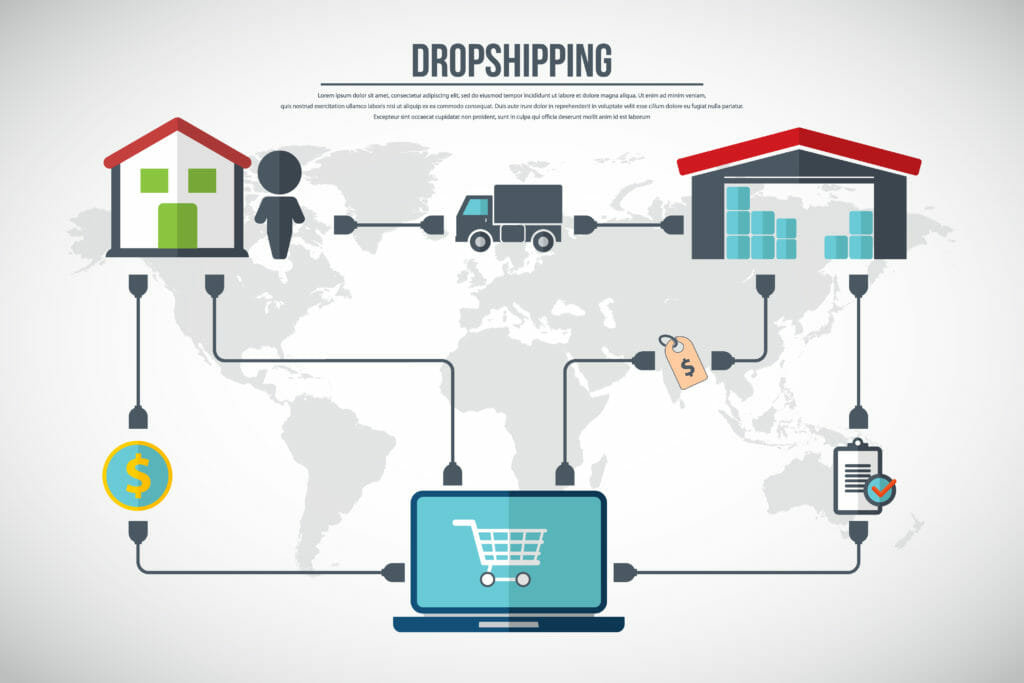
My biggest issue with dropshipping (and why I never explore it) is the low margins. You’re generally only making 10% net off your sales, which means you need a TON of traffic in order to make a lot of money.
However, if you’re someone who is willing to sacrifice margins for less effort, dropshipping is a more passive income approach that a traditional ecommerce store.
The key to a successful dropshipping business is finding the right nice and a reputable manufacturer you can rely on to deliver high quality goods, on time. Anything less can erode your website’s reputation, fast.
Pros of dropshipping
- More passive than eCommerce – there’s no inventory management, dealing with vendors, etc
- Low barriers to entry, it’s a low cost way to build an income generating asset
Cons of dropshipping
- The margins on product sales are low (15-20%), before paying your costs of the business
- Lack of control over the brand, you might be at the mercy of the supplier
4. Collect hourly consulting fees from clients
Consulting is generally the first step SEOs take before building an agency. It’s a simple relationship with a client to provide your SEO knowledge and skills in exchange for a pre determined hourly rate.
That hourly rate is determined by a number of factors:
- Your reputation and track record
- Years of experience and results
- Client needs and scope of the project
The key to a successful SEO consulting business is focusing on a niche. This way, you can establish yourself as a true expert. For example:
- Aleyda Solis focuses on international and mobile SEO
- Marie Haynes focuses on Google penalty recovery
- Jon Cooper focuses on link outreach

I generate additional income for myself doing consulting for agencies and in house teams. My leads come through this website, my YouTube Channel and Clarity.
Pros of consulting
- Cash up front from client retainers
- Command your own hourly rate (once earned…)
- Flexible hours
- Low overhead, no need to worry about offices, employees, etc
Cons of consulting
- You get to a certain point where you realize it’s not scalable to trade your time for money
- Since you can only work on 1 (maybe 2) projects at a time, client acquisition can be challenging
5. Collect agency retainers from clients
I need to preface this by saying – agency life is not for everyone. However, if you’ve built a successful consulting practice, scaling into an agency is a logical next step.
On top of that, agency business is BOOMING – by 2020, local SMBs would be spending $80 billion in SEO services. That’s only small businesses, not including enterprise level accounts.
I started my agency (WEBRIS) in 2017 and sold / merged with another in 2018.

A look into our agency team
Pros of building an SEO agency
- Cash up front from client retainers
- High ceiling for revenue growth
- High potential to sell or be acquired
- A growing industry with a lot of lead opportunities
Cons of building an SEO agency
- Long hours in a high stress work environment
- Dealing with clients is….challenging
- Margins are not as great as you’d think
- It’s a people based business, you’ll need a full staff
6. Sell white label SEO services to other agencies
A “white label” relationship is when you deliver services under another agency’s brand.
For example, a web development agency may want to start offering SEO services to their clients, but lacks expertise to do so. Instead, they could outsource the service delivery to you, while still maintaining the relationship with the client.
In order for a white label partnership to be successful, you need to have clear lines drawn ahead of time. For example:
- Who is responsible for project management?
- Who is responsible for client communications?
- Who is responsible for reporting?
You get the picture – these relationships usually fall apart because of the things that fall through the cracks.
Pros of white labeling your SEO
- Most white label relationships will NOT require you to talk to clients, which is awesome
- 1 agency can provide you with dozens (hundreds) of client accounts to work on. Generating business is much easier
Cons of white labeling your SEO
- Lower cost retainers, as the other party has margins to maintain
- You’re building income, but not a brand – you get NO credit for client results
7. Host seminars and charge per seat
SEO is driven by information – if you can establish yourself as expert, people are more than willing to pay for it.
I recently had a seminar out of our Miami office – it was a tremendous success. However, recruiting people to come to Miami was a challenge. I tapped into a network of people who have been following my content for years.
If you’re just getting started, it won’t be as easy for you – I’d suggest getting together a group of local experts and hosting a paid Meetup.
Over time as you build credibility, you can branch out on your own and host them regularly.

A photo of some attendees of our Miami SEO seminar.
Pros of hosting a seminar
- Great margins – the only main costs is location and acquisition of attendees
- Once you have the curriculum built, you can reuse it over and over
Cons of hosting a seminar
- It’s very difficult to get people to pay a high ticket amount
- They’re a lot of work getting together the curriculum (at first)
8. Build and sell SEO software
WARNING – advanced SEOs only.
A lot of SEO agency owners end up in the software business – the ceiling is higher and you don’t have to deal with clients.
Some of the top SEO software in the market was hacked together by agency owners looking to improve their service to clients.
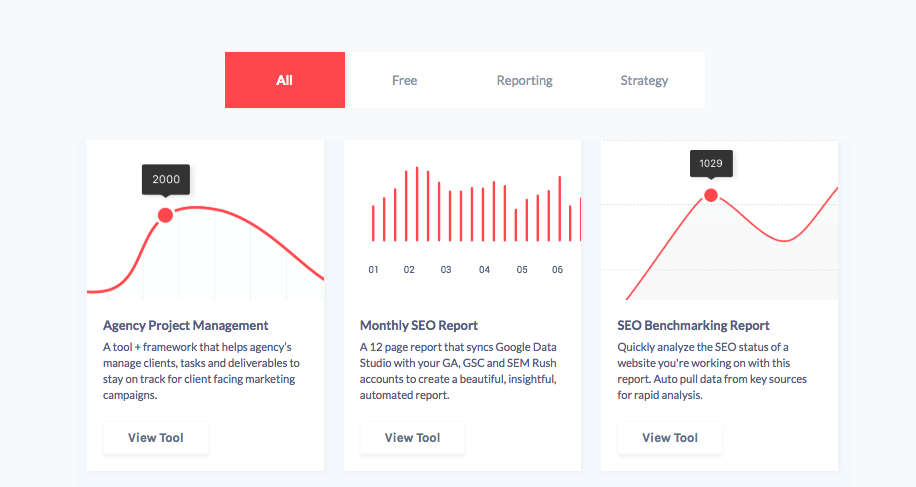
We’ve dabbled in some SEO tools ourselves
Pitchbox was built as in house tool to help with link outreach. It was later developed into a customer facing platform that’s become the go to tool for link building and outreach.
Glen Allsop recently covered potential gaps in the SEO software market, where he quoted Nitewatch:
When developing a new business, it’s extremely important to scratch your own itch.
SEO professionals make for the best tool builders because we’re intimately aware of what the market needs. If you want to develop SEO software, start by looking to solve the problems you’re having internally.
Pros of building SEO software
- The highest revenue potential of any option on this list. You can build a $100m+ company within a few years
Cons of creating SEO software
- It’s incredibly expensive, costs run out of control quickly
- If you don’t know how to code, you’ll need a partner who does. Even if you outsource the build of the tool, you’ll nee someone who can manage the developers
- It requires constant refinement and updates
9. Monetize a high traffic blog
If you’re a talented SEO, you can build a blog that generates a lot of traffic. Almost all forms of blog monetization require some form of advertising – advertising models only work for high traffic websites.
There’s a number of ways you can monetize a blog:
- Google Display Network banners on your site
- Custom banner ads
- Sponsored content
- Advertising packages (email blast, social post, etc)
In order to make this work, you need to find a niche with a high traffic potential and low competition. This is a unicorn on today’s internet, but still possible.
You can usually find these types of niches in emerging spaces, or verticals where websites aren’t investing in SEO assistance. For example, I’ve had success in:
- Cannabis
- Sneaker / streetwear culture
- Vintage clothing
- Drones and similar tech
This is a grossly over simplified, but I’ve got a full keynote where I break this down in more detail.
Also, read this post about Blog SEO.
Pros of monetizing a blog
- You can run a blog from anywhere in the world, as long as you have an internet connection
Cons of monetizing a blog
- It’s a lot of work, for not a lot of money
10. Get paid affiliate commissions
I’ve dabbled in affiliate marketing and to be frank, I struggled to make the money I wanted. However, I do know hundreds of SEOs who built an empire of affiliate sites and make a killing.
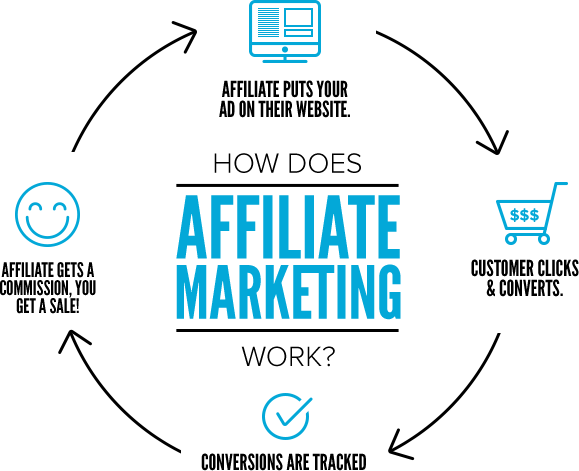
If you choose to go this route, I suggest becoming an Amazon affiliate. Why?
- Amazon has the largest inventory of products in the world
- People are going to buy from Amazon no matter what – if you can get them to your website (and cookie them), you’ll [potentially] get credit for other purchases they make
One of my favorite affiliate sites is Top10Supps. All the site does is review various types of supplements using in depth, long form blog posts that ranks really well in organic search.
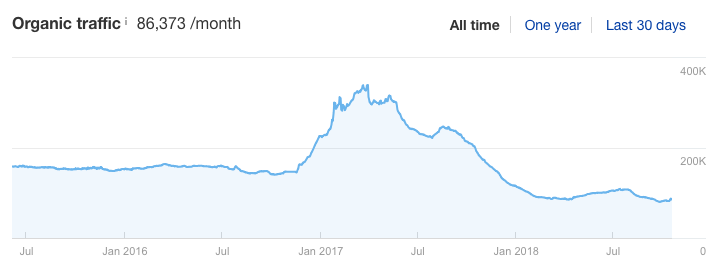
They then use BUY NOW buttons to drive people to Amazon to purchase the supplements.
This model works well because of the intent behind the content they create. When a consumer is looking for “protein reviews”, they’re deep in the purchase funnel and want to compare a number of products. If you can get them to your site, there’s a good chance they’ll click on your link and buy the product.

You get paid to promote products that you believe in, and content you wrote months ago and haven’t touched since can continue to bring in new income.
Also check out this awesome guide from Matt Diggity about affiliate SEO.
Pros of affiliate marketing
- The truest form of SEO passive income. No inventory, no vendors, you can focus on driving organic traffic to your site
Cons of affiliate marketing
- Your site needs to run on organic traffic, there’s just no margin for other tactics
- When you rely so heavily on organic traffic, an algorithm update could destroy you
- Payouts are generally low (3% or so) on a sale – you need A LOT of traffic to make a lot of money
11. Sell online courses about SEO
Similar to the seminars, you need a certain level of clout in the industry to get people to buy your course.
I’ve spent YEARS building a blog, YouTube Channel, networking and speaking at conferences to get the reach needed to sell courses online.
Now, my trainings have generated over $1,000,000 in sales (read my guide on how I sold over $182K of my link building course).
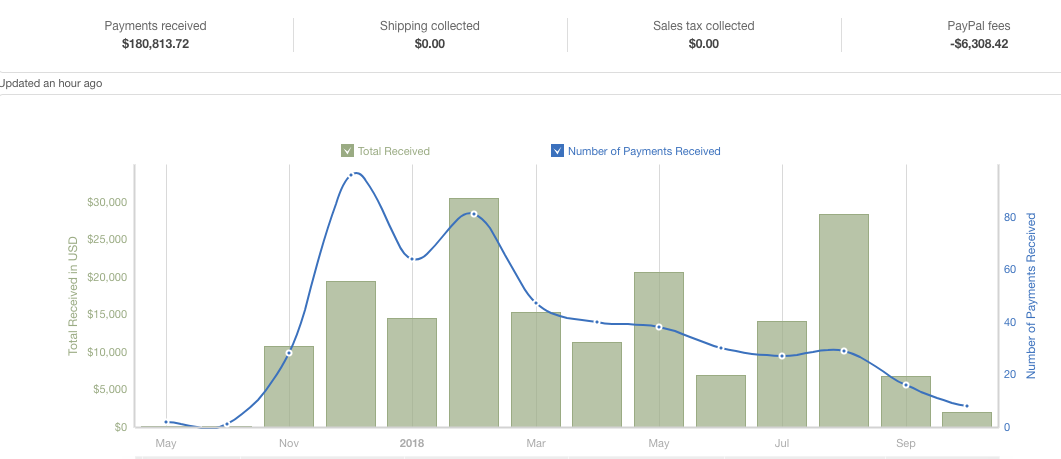
PayPal screenshot from one of my training courses
If you don’t have the time to build a full course, you can still monetize your knowledge with a paid newsletter, Facebook Group or Slack Channel. My business partner (Nick Eubanks) owns a private Slack channel called Traffic Think Tank – it gives you direct access to some of the world’s top marketing minds for a monthly fee.
Pros of selling training courses
- Ridiculously high margins – my courses profit margins are around 90%
- Once the course is built, it’s a true passive income stream
Cons of selling training courses
- It’s a long road to get people to want to buy from you
- It’s a TON of work building a course
12. Sell SEO writing services
Find SEO writing jobs through SEO and content marketing agencies or by approaching larger businesses directly (or a mix of the two). But the tricky part about advertising yourself as an SEO writer is that, by default, you’re not advertising yourself as anything else ( i.e. a subject matter expert).
With Google algorithms constantly improving, SEO writing that comes across as SEO writing doesn’t do well. Because of this, we see more and more cynicism toward content that’s designed simply to game the system.
The key is to either advertise as a niche writer with advanced experience in SEO or as an SEO writer who writes “for people first and search engines second.”
Pros of selling training courses
- Huge demand for writing services right now
- Work from anywhere in the world
Cons of selling training courses
- Not great money
- Writing is A LOT of work, even if you’re a natural
13. Sell Micro Services
I define a micro service as a subset of SEO. For example:
- Keyword research
- Link building
- Technical SEO
Agencies are constantly understaffed and over worked. Because of this, we’re always looking for reliable contractors to help with the burden.
If you can build a process to deliver a micro SEO service at scale, you’ve got yourself a nice little business.
There’s a number of ways you can monetize this:
- Cold email outreach to agencies
- Fiverr
- Upwork (or other freelancer platforms)
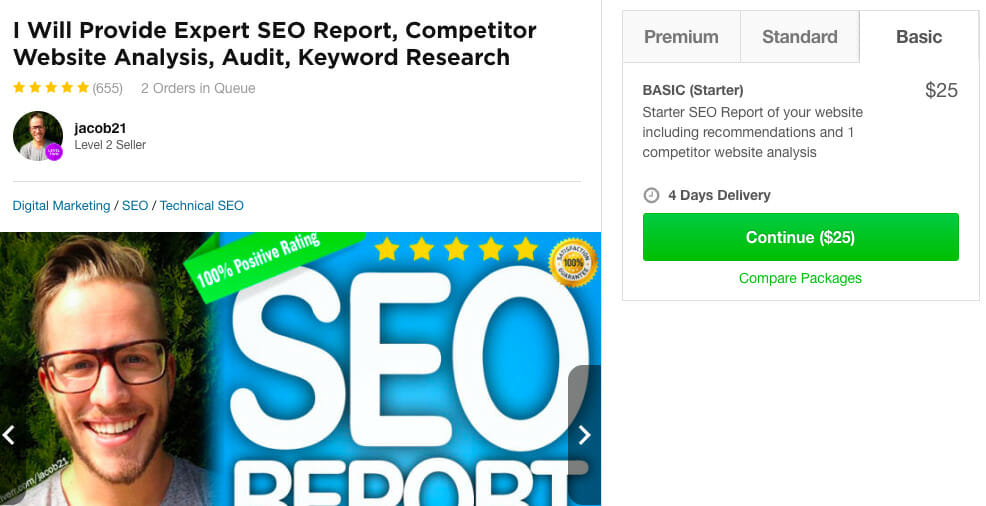
Fiverr is an underrated platform to make money
Whatever you choose, the key is becoming a verifiable expert in the space. I generally recommend putting together a detailed blog post or video about your process and promotion the hell out of it.
Pros of selling micro services
- You can build a name for yourself quickly if you do good work
- Delivering a micro services is far easier than end to end SEO
- There’s endless agencies / lead sources who need your services
Cons of selling micro services
- The revenue potential isn’t as high as selling services to client facing accounts
Where to Start
With so many options, where do you start? My suggestion is to keep networking and stay alert for new opportunities. The beauty of many of these strategies is that you can combine your SEO knowledge with other interests: public speaking, hobbies, or product niches. Your content or product will fare better when you have a genuine interest in what you’re doing.
If you’re interested in monetizing your SEO skills, look no further than The Blueprint Training.
We help SEO agencies, consultants and freelancers to scale past $100k/mo in revenue.
Book a call with a growth specialist to find out how we can help your business.